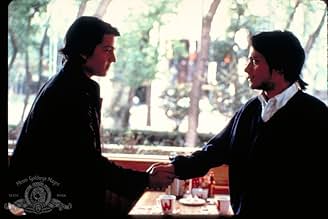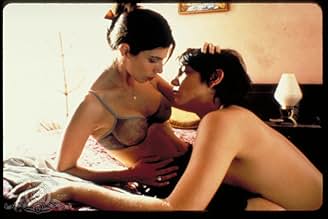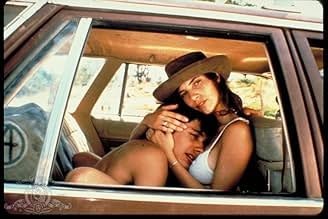No México, dois adolescentes e uma mulher mais velha, se embarcam numa viagem e aprendem sobre a vida, a amizade, o sexo e o outras coisas.No México, dois adolescentes e uma mulher mais velha, se embarcam numa viagem e aprendem sobre a vida, a amizade, o sexo e o outras coisas.No México, dois adolescentes e uma mulher mais velha, se embarcam numa viagem e aprendem sobre a vida, a amizade, o sexo e o outras coisas.
- Indicado a 1 Oscar
- 39 vitórias e 48 indicações no total
Daniel Giménez Cacho
- Narrator
- (narração)
- Direção
- Roteiristas
- Elenco e equipe completos
- Produção, bilheteria e muito mais no IMDbPro
Enredo
Você sabia?
- CuriosidadesWhen the producers tried to buy the rights of Frank Zappa's "Watermelon in Easter Hay" they were told by Zappa's family that Zappa requested that three of his songs were never played in any media except the album where they appear and that song was one of them. Gail Zappa, Frank's widow, saw the movie when editing was almost completed and agreed to make an exception because she considered that Zappa would be proud of the movie.
- Erros de gravaçãoThe movie takes place in the summertime - we know this from the boys just having graduated, their girls going off to Europe, the weather, etc. Yet at the wedding near the beginning of the film, the narrator tells us that in a few days the president of Mexico will go to Seattle for the WTO conference - which happened in November.
- Versões alternativasSeveral scenes edited out of the final movie were made available for public viewing on the movie's official Web site. The director claims to have created multiple edits of this film to satisfy censorship rules around the world. According to the director, one of these edits, allegedly intended for Mexican distribution in protest of that country's heavy censorship, runs less than 10 minutes.
- ConexõesEdited into Y tu mamá también: Deleted Scenes (2002)
- Trilhas sonorasGo Shopping
Performed by Bran Van 3000
Contains samples from "Shopping" written by Eek-A-Mouse (as Ripton Hylton) and Jamal-Ski
Published by Plaything Music, Explicit Two & Eek-A-Mouse Music
administered by Plaything Music (ASCAP)
Eek-A-Mouse appears courtesy of Explicit Entertainment, by license from Sunset Boulevard Entertainment
Avaliação em destaque
`Y tu Mama tambien,' a stunning new product of the New Mexican Cinema that is achieving crossover success in the American film market, is a frank, open and uninhibited celebration of teenage sex masterfully directed by Alfonso Cuaron and beautifully enacted by a trio of first-rate performers. Don't miss it provided you are not offended by sometimes-graphic depictions of sexual activity (please note that the film is unrated). The matter-of-fact, unflinching way in which Cuaron films his sex scenes purges them of indecency and helps to bring a new frankness to a subject all too often approached by American filmmakers from the angle of tittering exploitation (wherein the directors and writers seem as adolescent in their attitudes as the characters on the screen).
Not so here. The film centers around two boyhood chums, Tenoch and Julio, just embarking on their careers as university students, who, for one last glorious summer, decide to revel in all the wildness, hedonism and promiscuity that carefree adolescence has to offer (the title of the film is emblematic of the youthful immaturity of the characters). With their girlfriends away in Europe, the two decide to take a road trip through Mexico with Luisa, the attractive young wife of one of Tenoch's stuffed shirt cousins. While on the journey, the three of them not only indulge in all the bizarre sexual hijinks that both the situation and their hormones would lead one to expect, but they also learn a thing or two about life, about relationships and about how sex can be used both to bring people closer together as well as to pull them farther apart. For indeed, one thing the film makes very clear both to the characters and to us is that sex can often be employed as a weapon to wound those we care most about, especially with all the power shifting that takes place even in some of the most non-sexual of relationships. The boys also discover that sex can be used as a sublimation to avoid recognizing what one REALLY wants. This awakening leads to a final scene that is almost heartbreaking in its understated poignancy and pathos.
One of the most unsettling and thereby controversial aspects of the film (and the one that will make it uncomfortable for many in the audience) is that it refuses to take a moralistic stance regarding its characters' behavior. The filmmakers neither approve of nor condemn what these young people do they merely record the events with an attitude of detached objectivity that precludes any finger-wagging disapproval. If the characters learn any `lessons' from their experiences, they do so strictly on a subliminal, subconscious level and the same goes for the audience.
As a director, Cuaron displays a confidence and spirit rarely seen in filmmaking today. Along with his co-writer, Carlos Cuaron, the director has chosen to take an objective, almost documentary-style approach to the material, allowing the scenes to play themselves out in a way that makes them feel realistic, spontaneous and almost unscripted. He uses a shaky, handheld camera much of the time to enhance the immediacy of the experience. We often feel as if we are eavesdropping on the lives of these three fascinating individuals. As a result, not a single moment of the film feels forced, contrived or artificial. (Only the fate of one of the characters seems a bit convenient and contrived). Cuaron is not afraid to let the camera linger on a scene a moment two longer than necessary nor is he afraid to let the camera wander off on its own from time to time, such as when it spontaneously follows a woman into the back of a roadside café to show us the cooks hard at work in the kitchen. Many of the shots even have an elegiac, travelogue feel to them.
Cuaron has been blessed with three outstanding young actors Diego Luna, Gael Garcia and Maribel Verdu who bring his characters to vivid, endearing life. Utterly naturalistic in their every move, gesture and facial expression, the three of them play off each other in such a way that we never doubt for a moment the truth and sincerity of what we are seeing. American actors please take note!
`Y tu Mama tambien' is a stylistic triumph from first moment to last. It has a playful, expansive spirit, as reflected in its openhearted attitude towards sex, its wry humor, its affection for its people and its country, and its visual appeal and inventiveness (Emmanuel Lubezki did the glorious cinematography). The film has heart, soul and chutzpah. What more could a jaded filmgoer want?
Not so here. The film centers around two boyhood chums, Tenoch and Julio, just embarking on their careers as university students, who, for one last glorious summer, decide to revel in all the wildness, hedonism and promiscuity that carefree adolescence has to offer (the title of the film is emblematic of the youthful immaturity of the characters). With their girlfriends away in Europe, the two decide to take a road trip through Mexico with Luisa, the attractive young wife of one of Tenoch's stuffed shirt cousins. While on the journey, the three of them not only indulge in all the bizarre sexual hijinks that both the situation and their hormones would lead one to expect, but they also learn a thing or two about life, about relationships and about how sex can be used both to bring people closer together as well as to pull them farther apart. For indeed, one thing the film makes very clear both to the characters and to us is that sex can often be employed as a weapon to wound those we care most about, especially with all the power shifting that takes place even in some of the most non-sexual of relationships. The boys also discover that sex can be used as a sublimation to avoid recognizing what one REALLY wants. This awakening leads to a final scene that is almost heartbreaking in its understated poignancy and pathos.
One of the most unsettling and thereby controversial aspects of the film (and the one that will make it uncomfortable for many in the audience) is that it refuses to take a moralistic stance regarding its characters' behavior. The filmmakers neither approve of nor condemn what these young people do they merely record the events with an attitude of detached objectivity that precludes any finger-wagging disapproval. If the characters learn any `lessons' from their experiences, they do so strictly on a subliminal, subconscious level and the same goes for the audience.
As a director, Cuaron displays a confidence and spirit rarely seen in filmmaking today. Along with his co-writer, Carlos Cuaron, the director has chosen to take an objective, almost documentary-style approach to the material, allowing the scenes to play themselves out in a way that makes them feel realistic, spontaneous and almost unscripted. He uses a shaky, handheld camera much of the time to enhance the immediacy of the experience. We often feel as if we are eavesdropping on the lives of these three fascinating individuals. As a result, not a single moment of the film feels forced, contrived or artificial. (Only the fate of one of the characters seems a bit convenient and contrived). Cuaron is not afraid to let the camera linger on a scene a moment two longer than necessary nor is he afraid to let the camera wander off on its own from time to time, such as when it spontaneously follows a woman into the back of a roadside café to show us the cooks hard at work in the kitchen. Many of the shots even have an elegiac, travelogue feel to them.
Cuaron has been blessed with three outstanding young actors Diego Luna, Gael Garcia and Maribel Verdu who bring his characters to vivid, endearing life. Utterly naturalistic in their every move, gesture and facial expression, the three of them play off each other in such a way that we never doubt for a moment the truth and sincerity of what we are seeing. American actors please take note!
`Y tu Mama tambien' is a stylistic triumph from first moment to last. It has a playful, expansive spirit, as reflected in its openhearted attitude towards sex, its wry humor, its affection for its people and its country, and its visual appeal and inventiveness (Emmanuel Lubezki did the glorious cinematography). The film has heart, soul and chutzpah. What more could a jaded filmgoer want?
- Buddy-51
- 5 de abr. de 2002
- Link permanente
Principais escolhas
Faça login para avaliar e ver a lista de recomendações personalizadas
Detalhes
- Data de lançamento
- País de origem
- Idioma
- Também conhecido como
- Y tu mamá también
- Locações de filme
- Tepelmeme Villa de Morelos, Oaxaca, México(highway scenes)
- Empresas de produção
- Consulte mais créditos da empresa na IMDbPro
Bilheteria
- Orçamento
- US$ 2.000.000 (estimativa)
- Faturamento bruto nos EUA e Canadá
- US$ 13.839.658
- Fim de semana de estreia nos EUA e Canadá
- US$ 408.091
- 17 de mar. de 2002
- Faturamento bruto mundial
- US$ 33.616.692
- Tempo de duração1 hora 46 minutos
- Cor
- Mixagem de som
- Proporção
- 1.85 : 1
Contribua para esta página
Sugerir uma alteração ou adicionar conteúdo ausente


![Assistir a Tráiler [OV]](https://m.media-amazon.com/images/M/MV5BZDE5YjEwYTktN2NiYy00ZmZiLTk3YmEtOTYyYzljMTdkMGMzXkEyXkFqcGdeQXRodW1ibmFpbC1pbml0aWFsaXplcg@@._V1_QL75_UX500_CR0)
































